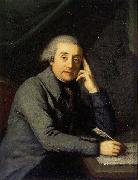Felix Maria Diogg Olja Måleriet ReproduceringAll Felix Maria Diogg Oil Paintings(b Andermatt, 1 July 1762; d Rapperswil, Schwyz, 19 Feb 1834). Swiss painter. From 1782 he was a pupil of Johann Melchior Wyrsch in Besanion, under whom he developed the essential aspects of his portrait style. He also studied further in Rome and Naples from 1786 to 1788. He was capable of executing bright, incisive portraits in the manner of Angelica Kauffman, as in Portrait of an Artist or psychological studies, best seen in Ulysses von Salis-Marschlins. Several of his group portraits, such as the Esslinger Family, show the influence of Italian and British painting, with which he seemed to be familiar. He was a friend of Johann Kaspar Lavater, discoursed with Goethe and enjoyed the company of the Swiss historian Johannes von Miller (1752-1809), whose portrait he painted. His portraits are generally bust-length types set against a solid, dark background. This format was favoured by his Swiss clientele and is seen in Burgomaster Heinrich Krauer (1799; Lucerne, Kstmus.), which also reveals the dignified wooden pose frequently selected by his models. His direct, fashionable treatment of the sitter attracted a wide range of clients from all levels of society. He seemed to be as much at ease painting the Empress of Russia, Yelisaveta Alekseyevna (1814; Karlsruhe, Staatl. Ksthalle) as he was portraying the bourgeoisie of central Switzerland. |
|||

|
|||
|
|
|||
|
||||||||
| Felix Maria Diogg (b Andermatt, 1 July 1762; d Rapperswil, Schwyz, 19 Feb 1834). Swiss painter. From 1782 he was a pupil of Johann Melchior Wyrsch in Besanion, under whom he developed the essential aspects of his portrait style. He also studied further in Rome and Naples from 1786 to 1788. He was capable of executing bright, incisive portraits in the manner of Angelica Kauffman, as in Portrait of an Artist or psychological studies, best seen in Ulysses von Salis-Marschlins. Several of his group portraits, such as the Esslinger Family, show the influence of Italian and British painting, with which he seemed to be familiar. He was a friend of Johann Kaspar Lavater, discoursed with Goethe and enjoyed the company of the Swiss historian Johannes von Miller (1752-1809), whose portrait he painted. His portraits are generally bust-length types set against a solid, dark background. This format was favoured by his Swiss clientele and is seen in Burgomaster Heinrich Krauer (1799; Lucerne, Kstmus.), which also reveals the dignified wooden pose frequently selected by his models. His direct, fashionable treatment of the sitter attracted a wide range of clients from all levels of society. He seemed to be as much at ease painting the Empress of Russia, Yelisaveta Alekseyevna (1814; Karlsruhe, Staatl. Ksthalle) as he was portraying the bourgeoisie of central Switzerland. |
||||||||
|
|
||||||||
| Måleriet Identifieringen :: 77785 Herrenportrat von Ratsherr 1791(1791) Medium Oil on canvas Dimensions 105.5 x 83.5 cm (41.5 x 32.9 in) cyf |
||||||||
|
|
||||||||
|
| FÖREGÅENDE KONSTNÄR Nästa Konstnär | |||||||
|
|
||||||||
|
Felix Maria Diogg (b Andermatt, 1 July 1762; d Rapperswil, Schwyz, 19 Feb 1834). Swiss painter. From 1782 he was a pupil of Johann Melchior Wyrsch in Besanion, under whom he developed the essential aspects of his portrait style. He also studied further in Rome and Naples from 1786 to 1788. He was capable of executing bright, incisive portraits in the manner of Angelica Kauffman, as in Portrait of an Artist or psychological studies, best seen in Ulysses von Salis-Marschlins. Several of his group portraits, such as the Esslinger Family, show the influence of Italian and British painting, with which he seemed to be familiar. He was a friend of Johann Kaspar Lavater, discoursed with Goethe and enjoyed the company of the Swiss historian Johannes von Miller (1752-1809), whose portrait he painted. His portraits are generally bust-length types set against a solid, dark background. This format was favoured by his Swiss clientele and is seen in Burgomaster Heinrich Krauer (1799; Lucerne, Kstmus.), which also reveals the dignified wooden pose frequently selected by his models. His direct, fashionable treatment of the sitter attracted a wide range of clients from all levels of society. He seemed to be as much at ease painting the Empress of Russia, Yelisaveta Alekseyevna (1814; Karlsruhe, Staatl. Ksthalle) as he was portraying the bourgeoisie of central Switzerland. |
||||||||
|
|
||||||||
|
KOMMA I KONTAKT MED Oss |






